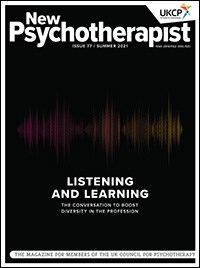
The need for more culturally informed trauma services to address inequality
 The summer 2021 issue of the New Psychotherapist looks at diversity and how a more diverse profession will help to increase access to psychotherapy for minority communities. We received a tremendous response to our call for members to give a snapshot of their practice and discuss what inclusion means to them and not all could be included in the magazine.
The summer 2021 issue of the New Psychotherapist looks at diversity and how a more diverse profession will help to increase access to psychotherapy for minority communities. We received a tremendous response to our call for members to give a snapshot of their practice and discuss what inclusion means to them and not all could be included in the magazine.
Here, integrative psychotherapist Indi Kaur discusses the need for more culture and trauma-informed services to help people of colour feel understood.
As a culture and trauma-informed psychotherapist, I have worked with clients who have experienced addictions, long-term unemployment, domestic and sexual abuse (including in childhood), work stress and many other varying intensity presentations. I’ve worked in free therapy services in the NHS, employee assistance contracts and private practice.
BAME clients have been referred to me when they have felt there would be a lack of inferiority or superiority in the therapy room due to me being a person of colour. There’s also been a sense that I would understand cultural issues and clients wouldn’t need to spend so much time explaining issues and dynamics to me. Bringing in a deeper understanding of cultures, roots and histories in theory and by lived experience where relevant in therapy helps to build bridges, using compassion between the generations and amongst the conflicted parts of the self.
A strong theme I’ve seen within Asian clients across the services, is the enmeshment culture within families or the community. This leads to a sense of personal values being infringed upon. Talking openly is therefore difficult, because one cannot be seen as ‘betraying’ the culture/religion or ‘shaming’ the family.
The latter is why people of colour would sometimes prefer to see a white therapist who is deemed to be removed from their community and values. This also provides a stronger sense of confidentiality. Conversely, these clients may end up moving to therapists of colour (as some of my clients have) because they hadn’t experienced feeling understood enough. There has also been a theme around struggling to balance dual heritage values and how these differences impact on relationships with other people of colour.
It’s important to have more culture and trauma-informed services across education, healthcare, translation services and the legal system, to increase awareness of the impact of historic and current issues, normalise struggles and help people of colour feel understood. Psychotherapy training must also be both culture and trauma-informed. It must raise awareness of the privileges of being White, making safe space for guilt and shame. I believe in bringing this conversation to group process which is essential for therapists to have in a country as wonderfully diverse as the UK. Trainers must model authenticity in handling this conversation. It is hard and can be triggering to all and so it needs to be held in a safe environment – psychotherapy training is geared for exactly that.
My experience of working with clients in free services such as the NHS is that therapy is essential, not a luxury. Unfortunately due to austerity, many are left to struggle with little support available, so struggles become a lifestyle and lifestyles become cyclical. Psychotherapy can change that.
Life traumas do not only affect one person, they affect entire family systems. They have an impact in the workplace, in schools, in the justice system. When individuals receive therapy that helps them to experience an improved sense of self, improved parental functioning and positive impact on their children’s wellbeing, be better equipped for self-care and need fewer healthcare appointments and medication for physical ill health symptoms, the benefits to society are clear.
Share
Like most websites, we use cookies. If this is okay with you, please close this message or read more about your options.


